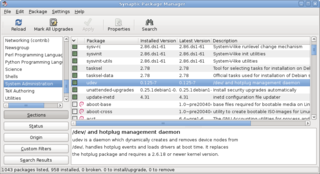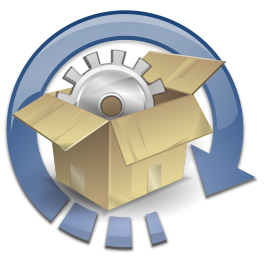
Slackware is a Linux distribution created by Patrick Volkerding in 1993. Originally based on Softlanding Linux System (SLS), Slackware has been the basis for many other Linux distributions, most notably the first versions of SUSE Linux distributions, and is the oldest distribution that is still maintained.

A package manager or package-management system is a collection of software tools that automates the process of installing, upgrading, configuring, and removing computer programs for a computer in a consistent manner.
In software development, Make is a build automation tool that builds executable programs and libraries from source code by reading files called makefiles which specify how to derive the target program. Though integrated development environments and language-specific compiler features can also be used to manage a build process, Make remains widely used, especially in Unix and Unix-like operating systems.

Advanced package tool, or APT, is a free-software user interface that works with core libraries to handle the installation and removal of software on Debian, and Debian-based Linux distributions. APT simplifies the process of managing software on Unix-like computer systems by automating the retrieval, configuration and installation of software packages, either from precompiled files or by compiling source code.

In software development, GNU Automake is a programming tool to automate parts of the compilation process. It eases usual compilation problems. For example, it points to needed dependencies.

Apache Ant is a software tool for automating software build processes which originated from the Apache Tomcat project in early 2000 as a replacement for the Make build tool of Unix. It is similar to Make, but is implemented using the Java language and requires the Java platform. Unlike Make, which uses the Makefile format, Ant uses XML to describe the code build process and its dependencies.
In software development, code reuse, also called software reuse, is the use of existing software, or software knowledge, to build new software, following the reusability principles.
Maven is a build automation tool used primarily for Java projects. Maven can also be used to build and manage projects written in C#, Ruby, Scala, and other languages. The Maven project is hosted by The Apache Software Foundation, where it was formerly part of the Jakarta Project.

Autopackage is a free computer package management system aimed at making it simple to create a package that can be installed on all Linux distributions, created by Mike Hearn around 2002.

In software development, CMake is cross-platform free and open-source software for build automation, testing, packaging and installation of software by using a compiler-independent method. CMake is not a build system itself; it generates another system's build files. It supports directory hierarchies and applications that depend on multiple libraries. It is used in conjunction with native build environments such as Make, Qt Creator, Ninja, Android Studio, Apple's Xcode, and Microsoft Visual Studio. It has minimal dependencies, requiring only a C++ compiler on its own build system.

Clojure is a dynamic and functional dialect of the Lisp programming language on the Java platform.
Elixir is a functional, concurrent, high-level general-purpose programming language that runs on the BEAM virtual machine, which is also used to implement the Erlang programming language. Elixir builds on top of Erlang and shares the same abstractions for building distributed, fault-tolerant applications. Elixir also provides tooling and an extensible design. The latter is supported by compile-time metaprogramming with macros and polymorphism via protocols.

Meson is a software tool for automating the building (compiling) of software. The overall goal for Meson is to promote programmer productivity. Meson is free and open-source software written in Python, under the Apache License 2.0.

Boot is a build automation and dependency management tool written primarily in the Clojure programming language.

Bazel is a free and open-source software tool used for the automation of building and testing software. Google uses the build tool Blaze internally and released an open-sourced port of the Blaze tool as Bazel, named as an anagram of Blaze. Bazel was first released in March 2015 and was in beta status by September 2015.
In computer programming, self-hosting is the use of a program as part of the toolchain or operating system that produces new versions of that same program—for example, a compiler that can compile its own source code. Self-hosting software is commonplace on personal computers and larger systems. Other programs that are typically self-hosting include kernels, assemblers, command-line interpreters and revision control software.

Mix is a build automation tool for working with applications written in the Elixir programming language. Mix was created in 2012 by Anthony Grimes, who took inspiration from Clojure's Leiningen. Soon after, Mix was merged into the Elixir programming language itself and to this day is one of the six applications that are part of the Elixir language. Mix provides functionality for creating, compiling, and testing Elixir source code and for managing dependencies and deploying Elixir applications.











